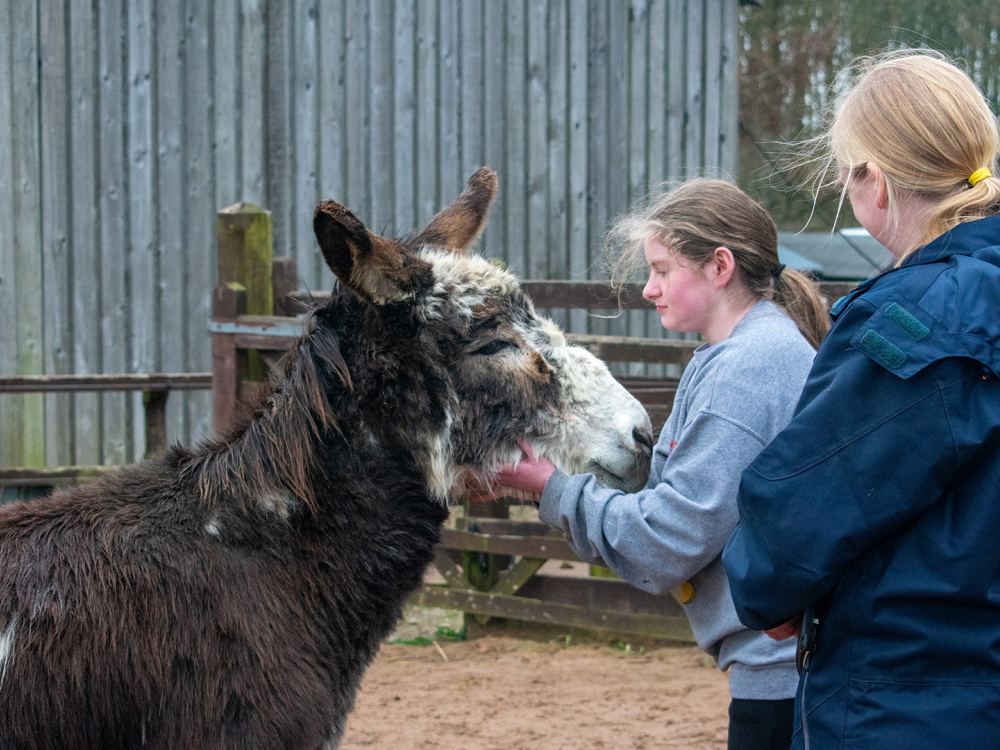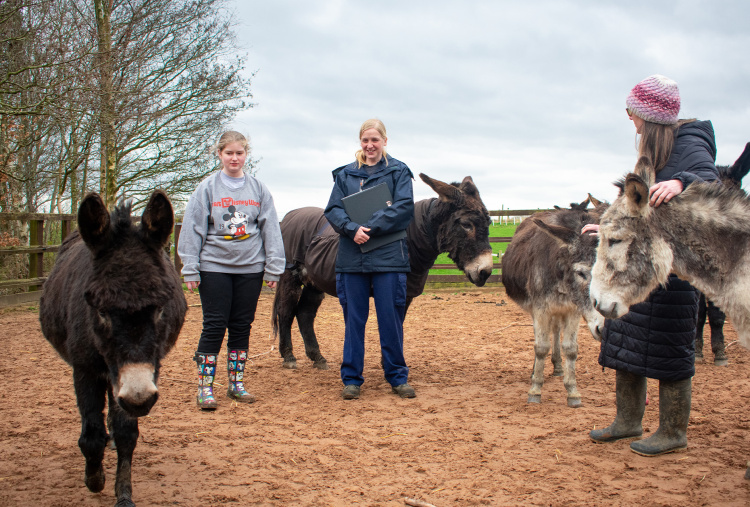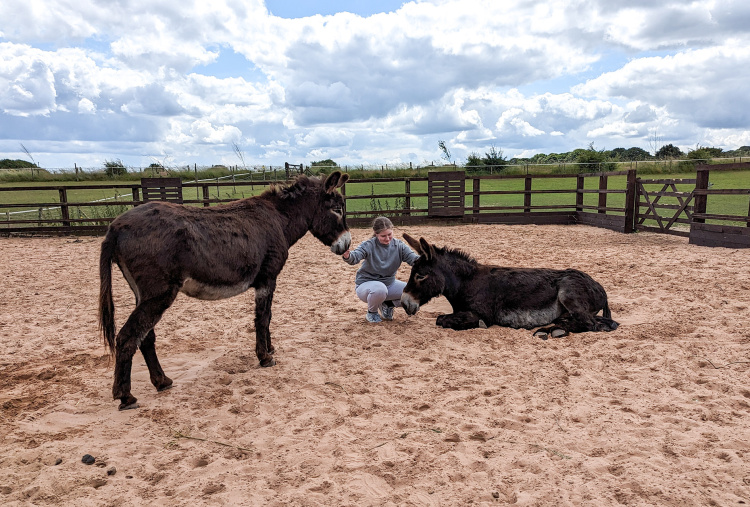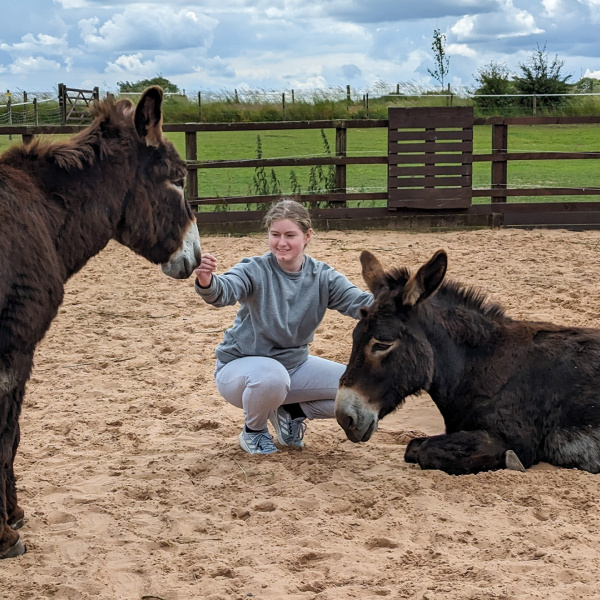A teenager who was struggling with pressures surrounding her GCSE exams has found support among the four-legged residents of our sanctuary in Leeds.
Clara Bowers,15, from Halifax was diagnosed with autism when she was nine years old. As she approached her exams last year, her anxiety level increased, which led to her feeling overwhelmed and having difficulty concentrating at school.
Clara’s increased anxiety prompted her mum Ana to investigate ways to help her manage the stress levels she was experiencing at school. As Clara always had a close rapport with animals, she searched for organisations with animals who may be able to help.
It was then they discovered the Donkey Assisted Activities programmes offered by The Donkey Sanctuary Leeds, and after being referred Clara attended a taster session at our centre in Eccup. During this visit, her mum couldn’t believe her daughter’s reaction to being among the resident donkeys for the first time, and said she’d not seen her daughter smile like this in a long time.
Clara said: “I find it difficult to read human facial emotions and feel that I connect better with animals, as they listen unconditionally.”
Samantha Butcher, Equine Coach at our Leeds sanctuary, facilitates and delivers donkey-assisted activities at the centre. She said: “Clara came to us looking for ways to stay calm and present in the moment, to practice some mindfulness techniques, create positive memories and deal with the day-to-day pressures of school life she was feeling.
“To begin with she was very quiet, and didn’t make eye contact, but she soon began to develop a real bond with the donkeys, and we could see her light up whenever she was around them.”
Staff at the sanctuary work with lots of clients, but it was rare to see the donkeys behave in the way they did around Clara. They noticed a special connection between her and the donkeys. When she arrived at the centre for her session, the donkeys were naturally drawn to her and would each gently nudge her with their soft muzzles.
Samantha recalled a particular moment during a session with a 15-year-old donkey called Harry, who originally came into the sanctuary along with six other donkeys, after being abandoned at the roadside in Ireland. She said: “Harry chose to lay down next to Clara in the sand arena while she was taking part in a mindfulness session – time seemed to stand still.
“The smile on Clara’s face when Harry came to support her was so powerful. Clara’s mum was stood watching the session and I remember she had tears of happiness in her eyes. That moment will be something I will always remember, and I believe they will too.”
Every week Samantha and her colleagues have seen Clara develop in confidence both with them, and with the donkeys. From the first session they have seen her smile grow and through her mum Ana have heard positive feedback from her school.



Clara has been able to use some of the techniques she has learnt to help calm herself in difficult situations. She has also been able to regulate herself during stressful situations at school, whereas previously she found it difficult to communicate how she was feeling. Her teacher also noticed a significant change in her ability to self-regulate and handle challenging situations that may arise, making a positive impact on her education.
Following her exams, Clara plans to go to college where she hopes to study animal care. She has wanted to work with animals for years, but thanks to her experience with the donkeys she has now been inspired to help rehome animals and give them a better life after seeing how the sanctuary helps the donkeys.
Clara has also used the knowledge gained by watching the donkeys’ body language and reactions at the sanctuary to help with her own animals at home. Their home is a menagerie for a whole host of pets including chickens, two dogs, a rabbit and a snake, and she has built a much stronger connection to her dog Rex, noticing how his body language and subtle ear movements indicates how he’s feeling.
Clara’s mum Ana said:“Clara’s bond with the donkeys has been a happy emotional journey, and the programme has been a huge benefit to her mental wellbeing.
“Clara instantly felt comfortable in the presence of the donkeys, and they soon gravitated towards her. It was a very emotional experience as a parent of a child with autism, but it was obvious from her very first session how comfortable she was.”
Cathryn Hampshire, Centre Manager at our Leeds sanctuary, said: “Hearing how Clara was able to take the learning and techniques and apply them to her emotions in a stressful situation is brilliant.
“Emotional regulation – or exploring how we think and feel about something – is a form of mindfulness practice. By learning this tool in her weekly sessions, it helped Clara to use her five senses and focus on her breathing to remain calm and in control.”
Samantha has also learned from her experience working with Clara, saying: “She has been such a pleasure to work with and I could see from early on the differences the donkeys were making to her life.
“Clara also showed me the world through her eyes and has inspired me to learn more about autism and neurodiversity as a whole.”
Clara and Ana are determined to continue to raise awareness of autism and have had incredible support from The National Autistic Society based in Calderdale. Mark Johnson, Branch Chair commented "It is wonderful to hear about Clara's experience at The Donkey Sanctuary and highlights the profound impact that animals can have on autistic individuals, providing them with invaluable support and a sense of connection.
“We are all immensely proud of Clara and the progress she has made and we are committed to supporting initiatives that promote the wellbeing of autistic individuals in our community."
Clara is also learning British Sign Language as she believes it can benefit people with autism to communicate in a different way, if they are having difficulties expressing themselves.
